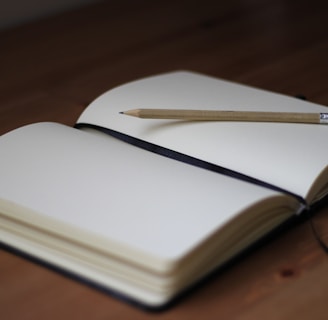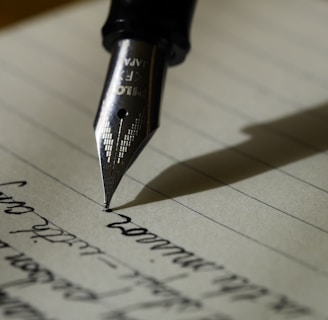How to Journal Correctly
Here's how you can start this major self-improvement aspect.
MINDFULNESS
3/14/20246 min read


Journaling is one of the most crucial steps in your personal development and self-improvement journey. To stop for a couple minutes a day to write down your hopes, thoughts, goals and emotions is an incredibly helpful tool to declutter your mind. It won't only clean your mind out, but it will also quiet it down a bit too. To write about your own experience once a day or every couple of days will increase your intelligence, confidence and general awareness of situations.
But how do you start journaling? What do you write about? What if it gets boring? These are all questions you might be asking. There is definitely a right way and a wrong way to journal, and this simple 101 guide will help you do the correct method rather than wasting your time and getting no results.
What is journaling?
If you are new to self-improvement, you probably have not given much thought into journaling. Yes, you may have had a diary as a kid but that is completely different. Journaling is writing about your own thoughts, beliefs and opinions about life as a way to relax your mind of storing so much information and worry all at once.
Why self-improvement values this activity so much is because it keeps you in the moment and allows you to appreciate your life and question what it is truly for. People in modern days are so stressed and overwhelmed by life in general that they are too hyper-obsessed with their day-to-day jobs and chores that they cannot reflect and ponder about existence and their own personal dreams.
The three ways to journal
There are an infinite amount of things you can journal about. I narrowed it down to three definitive journaling strategies that will do wonders for your own self-improvement.
Strategy 1: Shallow Journaling
Shallow journaling is simply just quickly writing down a few sentences from a prompt in only a few minutes. Try to make these quick notes hard-hitting if possible though, as the more depth you give the journaling the better you'll get out of it. Shallow journaling is good when you're in a hurry or have some time to just write some stuff down.
Strategy 2: Gratitude Journaling
More impactful than shallow journaling, but with less reflective substance to the writing. Gratitude journaling is just writing down what you are thankful for and why you are thankful for it. Thankful, grateful, appreciative or glad can be interchangeable here when starting the sentences.
Topics could be broad or specific, anywhere from your parents to simply just a water bottle or shoe. Just remember to explain why you are thankful for it, as just stating it is not enough. Gratitude journals can be as long as you want them, from a few sentences to a couple paragraphs and the time range to write them is really up to you as well.
The primary benefit from gratitude journaling is that as you do it consistently, the more you notice thoughts of being grateful throughout your day. Through this, you become more and more mindful and present with yourself.
Strategy 3: Deep Journaling
Most beneficial of any of the three. Deep journaling is basically just a deep clean or reorganization of your thoughts and thinking process. You really pry at your mind to discover your deepest emotions and beliefs. To do this method, you need a really strong prompt to write about that will set off a conversation or even an argument in your mind, going back and forth and finding subconscious thoughts and feelings.
Plan on deep journaling for long periods of time with several paragraphs, as you really need to dig deep to get the best out of it. Try to set aside some time in your day or week to this incredibly changing form of journaling that takes practice and effort to improve.
To sum all the different kinds of journaling up, shallow journaling is like a quick spray down of your mind, gratitude journaling is choosing things you think of and explain why you like them and deep journaling is a power wash of your conscious itself.
EDITOR'S ROOKIE MISTAKE:
A journal is NOT a diary. For most of my "journaling" experience I was just recapping my daily occurrences. I didn't feel any different after months of doing it. Recounting your life are what diaries are for. You're not writing a diary, you are writing a journal. To know the difference will keep you from wasting years of your life believing you were journaling when all that time you weren't.
Paper or Online?
You wouldn't be reading this if you weren't tech savvy. Therefore you probably were thinking about opening up a new document on your device and began rambling about whatever you think about. Don't do it. Pick up a pen and find even just a piece of paper and journal there rather than on your computer.
Handwriting your entries will give even more power to what you write about, because instead of tapping plastic keys you're actually moving your hands and thinking of words to express your ideas.
By all means, you can journal online if you really wanted to but paper and pen will give much more power to your writing.
EDITOR'S ROOKIE MISTAKE:
I tested out journaling online to see if there was any change with it and writing on paper. After days of repetitively doing it, I noticed I started copying and pasting responses from other days to allow me to write faster. You can't do that on paper, and thus I concluded for myself that writing in a journal itself is more beneficial for me. This really depends on the person, though.
What do I write?
Difficult questions that take thought and time to answer is almost required for journaling. Don't simply ask yourself stupid questions like "what is my favorite color?" and spend an hour describing it and explaining why it is your favorite. You need to start a conversation in your mind and journal it like a transcript.
Go back and forth between many viewpoints, debating your internal monologue in an almost civil war of the mind. This is how you can defeat your anxious conscious, killing the voice in side your head so you can think clearly without the inhibition of nervousness.
Here are some prompts you can start out with that can really fire up these internal conversations
How do I structure my journal?
Journaling can be as basic as just finding a spare sheet of paper and just writing stuff down, or you can have yourself a whole entire journal dedicated for entries and writing.
Try to put the date in the corner of the page if you do use a journal book, and writing down a log number has helped me track my progress and remain consistent.
I'd also advise beginning a Self-Improvement Journal, which is a specialized journal specifically for goalsetting, tracking progress, journaling and generic inspiration. This article explains how you can make one:
Progressive overload applies to journaling, too
Weightlifters and gym-goers know this phrase all to well, but it also is essential for making progress journaling too. You can start out shallow journaling at first, but eventually your responses become more thought-provoking and longer, transitioning into more deep journaling responses. This is a natural progression that can easily occur when you journal regularly.
If you have begun to read more self-help books and other classic literature you might see your vocabulary become more complex too will curating your entries, this not only indicates a higher intelligence but also more deeper thinking going into your responses.
Keep challenging yourself while journaling, and hold yourself accountable when you don't have a very detailed response or put it aside for other activities instead. It will only work if you do it correctly with practice.
Try not to make journaling become a chore
Journaling can quickly become mundane and boring after repeatedly doing it for a long stretch of time. This is why it is good to mix up the length and method of your responses to avoid getting so tired of journaling you end up quitting. You can take "rest days" from journaling, as your mind is a muscle, and it needs rest sometimes.
Another good idea is to set a time of day to journal as well where you're not too exhausted. The morning is a fantastic time to journal, as your mind is refreshed from sleeping and the day's tasks haven't really been accomplished yet. Set aside time in your morning routine to journal, and make it a habit so it doesn't become a chore.
EDITOR'S ROOKIE MISTAKE:
I used to journal before going to sleep. Because the day was over, my brain was easily distracted and I write short responses so I could go to sleep sooner. Don't put yourself through this, you'll get more advantages through journaling first thing in the morning.
In All,
Practicing journaling as an activity with significantly improve your self-improvement skills and allow you to reflect on your life in a more in-depth manner with writing. In conjunction with other activities, it will most definitely develop you as a more mindful and self-respecting person.


